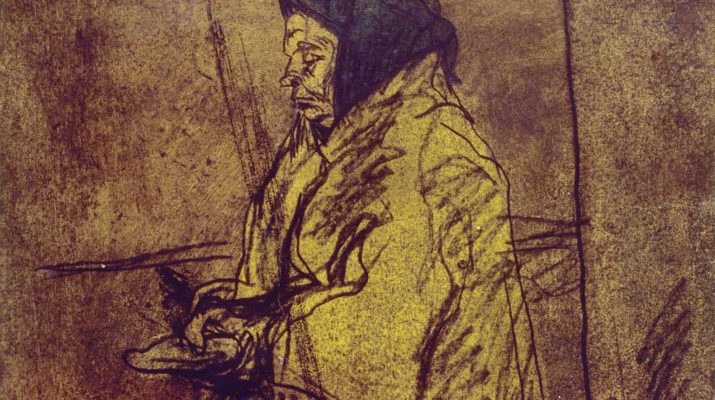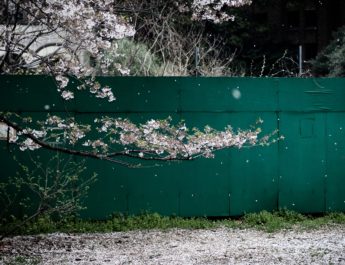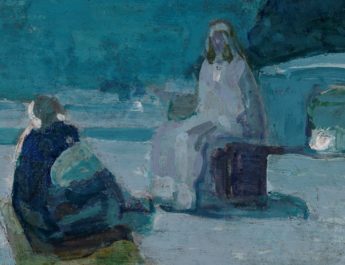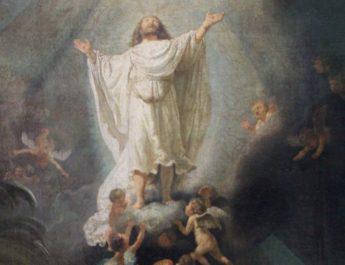Psalm 41
To the leader.A A PsalmB of David.C
A “leader” = natsach. Properly, something that glitters from a distance. So, something that stands out, excels, has status/standing (such as a chief musician or superintendent of Temple services). This can also mean to be permanent or enduring.
B “Psalm” = mizmor. From zamar (making music; used specially of music to worship God; music with singing, singing praise, singing psalms); may be from zamar (to trim or prune). This is a melody or a psalm.
C “David” = David. From the same as dod (beloved, love, uncle); the root may mean to boil, which is used figuratively to describe love. So, this implies someone you love such as a friend, a lover, or a close family member like an uncle. David’s name likely means something like “beloved one.”
1 HappyD are those who considerE the poor;F
the LordG deliversH them in the day of trouble.I
D “happy” = esher. From ashar (to go straight, lead, guide; to be level and so to be right, blessed, honest, happy). This is happy or blessedness.
E “consider” = sakal. This is to consider or be prudent and so it can mean to instruct or be an expert. It can also mean dealing prudently, which implies success and prospering. This verb presumes intelligence of the subject. In one form of the verb, it can mean laying cross-wise.
F “poor” = dal. From dalal (to be low, hang, fade, be emptied, become poor, be oppressed). This is lean, weak, needy, poor. Properly, it is one who is dangling.
G “Lord” = YHVH. From havah (to be, become) or hayah (to come to pass, become, be). This is the name of the God of Israel, the self-existent and eternal one, the tetragrammaton. This pronunciation has been lost to time so “Lord” is generally used in its place.
H “delivers” = malat. This is to be smooth, which implies to escape as slipping away from. It can also be release, rescue, deliver, or preserve. It can be used specifically to meaning giving birth or making sparks.
I “trouble” = ra’. From ra’a’ (to be evil, bad, afflict; properly, to spoil – to destroy by breaking into pieces; figuratively, to cause something to be worthless; this is bad in a physical, social, or moral sense; that which displeases, to do harm or mischief, to punish or vex). This is bad, disagreeable, that which causes pain, misery, something having little or no value, something that is ethically bad, wicked, injury, calamity. This refers to anything that is not what it ought to be – a natural disaster, a disfigurement, an injury, a sin.
2 The Lord protectsJ them and keeps them alive;K
they are called happyL in the land.M
You do not give them up to the willN of their enemies.O
J “protects” = shamar. This is to keep, watch, or preserve. It means to guard something or to protect it as a thorny hedge protects something.
K “keeps…alive” = chayah. This is to live or keep alive in a literal or figurative sense. So, it an be revive, nourish, or save.
L “called happy” = ashar. Related to “happy” in v1. 16x in OT. See note D above.
M “land” = erets. Root may mean to be firm. This is earth, ground, field land, or country.
N “will” = nephesh. Related to naphash (to refresh or be refreshed). This is soul, self, person, emotion. It is a breathing creature. Can also refer to appetites and desires.
O “enemies” = oyeb. From ayab (to hate or be hostile to). This is a foe or enemy as one that you are hostile to.
3 The Lord sustainsP them on their sickbed;Q
in their illnessR you healS all their infirmities.T, U
P “sustains” = saad. 12x in OT. This is to support – usually used in a figurative sense. So it is sustain, hold, refresh, comfort, establish.
Q “sickbed” = eres + devay. Eres is 10x in OT. Root may refer to an arch. So, this would be a couch or bed that has a canopy. Devay is 2x in OT. From daveh (faint, ill, sick from menstruation); from davah (to be sick). This is illness, languishing, loathsome.
R “illness” = choli. From chalah (properly, this is to be worn; hence, being weak, sick, or afflicted; it can also mean to grieve or, positively, to flatter or entreat). This is sickness, affliction, grief, worry, or calamity.
S “heal” = haphak. This is to turn, overturn, change, return, turn over, pervert.
T “infirmities” = mishkab. From shakab (to lie down, lodge; lying for sleep, sex, or other reasons). This is a place where one lies down i.e. a bed, couch, or bedchamber. It can also be used in an abstract sense to refer to sleep or euphemistically for sex.
U Literally “lying {or sleeping}, you will overturn his illness.”
4 As for me, I said, “O Lord, be graciousV to me;
healW me,X for I have sinnedY against you.”
V “be gracious” = chanan. This is to beseech, show favor, be gracious. Properly, it is to bend in kindness to someone with less status.
W “heal” = rapha. Properly, this is to repair by stitching – figuratively this means to heal or cure. It can also mean to make whole.
X “me” = nephesh. Same as “will” in v2. See note N above.
Y “sinned” = chata. This is properly to miss, and so figuratively it is used for sinning, bearing the blame. It implies a forfeiture or loss of something.
5 My enemies wonderZ in maliceAA
when I will die,BB and my nameCC perish.DD
Z “wonder” = amar. Literally “say.”
AA “malice” = ra’. Same as “trouble” in v1. See note I above.
BB “die” = mut. This is to die in a literal or figurative sense. It can also refer to being a dead body.
CC “name” = shem. May be from sum (to put, place, set). This is name, fame, renown. A name was thought to indicate something essential about a person – something about their individuality. So, this word can also mean honor, authority, or character.
DD “perish” = abad. To wander off, lose self. This implies to perish, destroy, die, vanish, or be broken or corrupt.
6 And when they come to seeEE me, they utterFF empty words,GG
EE “see” = raah. This is to see in a literal or figurative sense so stare, advise, think, view.
FF “utter” = dabar. This is generally to speak, answer, declare, or command. It might mean to arrange and so to speak in a figurative sense as arranging words.
GG “empty words” = shav. Perhaps from the same as sho (ruin, desolation, storm; from a root that means rushing over – hence a storm and hence devastation). This is emptiness, false, worthless, deceit. It can also refer to evil, guile, idolatry, or something being in vain.
while their heartsHH gatherII mischief;JJ
when they go out, they tellKK it abroad.LL
HH “hearts” = leb. May be related to labab (to encourage; properly, to be encased as with fat; used in a good sense, this means to transport someone with love; used in a bad sense, it can mean to dull one’s senses). This is the heart, courage, one’s inner self, the mind, or the will. Heart is only used in a figurative sense in the Old and New Testaments.
II “gather” = qabats. This is to collect, assemble, heap, grasp, or gather.
JJ “mischief” = aven. Root may mean panting as one does when expending a lot of energy, especially when it comes to nothing. This is nothingness, trouble, sorrow, distress, wickedness, evil, harm, sorrow, misfortune, and mischief. It is also used specifically to refer to idols.
KK “tell” = dabar. Same as “utter” in v6. See note FF above.
LL “abroad” = chuts. Root may mean to sever. So, this is something that is separated by a wall – the outside, the street, a field, highway, or abroad.
7 All who hateMM me whisperNN togetherOO about me;
they imaginePP the worstQQ for me.
MM “hate” = sane. This is an enemy or foe. It is hating with a personal hatred.
NN “whisper” = lachash. 3x in OT. This is to whisper or charm i.e. murmur a spell like a magician does.
OO “together” = yachad. From yachad (to join, be united). This is a unit, both, altogether, unitedness, alike.
PP “imagine” = chashab. This is properly to braid or interpenetrate. Literally it is to create or to wear. Figuratively, it can mean plotting – generally in a negative sense. More broadly, this can also mean think, consider, or make account of.
QQ “worst” = ra’. Same as “trouble” in v1. See note I above.
8 They think that a deadlyRR thingSS has fastenedTT on me,
that I will not riseUU againVV from where I lie.WW
RR “deadly” = beliyyaal. From beli (lack, nothing, without, wearing out, failure, destruction); {from balah (to grow old, wear out, waste away, consume, spend)} + yaal (to gain, profit, do good, ascend, be useful or valuable; benefitted). This is lacking profit i.e. worthlessness, destruction, evil, ungodly person, wickedness, or Belial.
SS “thing” = dabar. Related to “utter” in v6. From dabar (see note FF above). This is speech, a word, a matter, an affair, charge, command, message, promise, purpose, report, request. It is a word, which implies things that are spoken of in a wide sense.
TT “fastened” = yatsaq. This is to pour out, flow, wash away, or overflow. It can imply melting as one does to cast metal. By extension, it can refer to something being steadfast, stiffened, firmly in place.
UU “rise” = qum. To arise, stand, accomplish, establish, abide. This is rising as in rising against, getting up after being sick or asleep, arising from one state to another, becoming powerful, or rising for action. It can also be standing in a figurative sense.
VV “again” = yasaph. This is to add, increase, continue, exceed.
WW “lie” = shakab. Related to “infirmities” in v3. See note T above.
9 Even my bosomXX friendYY in whom I trusted,ZZ
XX “bosom” = shalom. From shalam (to be complete or sound; to have safety mentally, physically, or extending to one’s estate; so, if these things are safe and complete, the implication is that one would be friendly; and, if being friendly, one would make amends and that friendship would be reciprocated). This is completeness, soundness, welfare, favor, friend, good health. It is to be safe and figuratively well, happy, at peace, friendly. Abstractly, it includes the ideas of welfare and prosperity (not in excessive wealth, but in having enough).
YY “friend” = ish. Perhaps from enosh (human, humankind, mortal); from anash (to be weak, sick, or frail). This is man, husband, another, or humankind.
ZZ “trusted” = batach. This is to hide for refuge, be secure or sure. Figuratively, it refers to trust, being confident, or hoping.
who ateAAA of my bread,BBB has liftedCCC the heelDDD against me.
AAA “ate” = akal. This is to eat, devour, burn up, or otherwise consume. It can be eating in a literal or figurative sense.
BBB “bread” = lechem. From lacham (to eat, feed on). This is bread, food, loaf. It can refer to food more generally for people or for animals.
CCC “lifted” = gadal. This is to grow up, become great, become wealthy – to advance. The root meaning may be to twist in the sense of the process of growing.
DDD “heel” = aqeb. 13x in OT. This is heel, hind part, hoof, rear guard of an army, one who lies in wait, or usurper.
10 But you, O Lord, be gracious to me,
and raise me up, that I may repayEEE them.
11 By this I knowFFF that you are pleasedGGG with me;
because my enemy has not triumphedHHH over me.
EEE “repay” = shalam. Related to “bosom” in v9. See note XX above.
FFF “know” = yada. This is to know, acknowledge, advise, answer, be aware, be acquainted with. Properly, this is to figure something out by seeing. It includes ideas of observation, recognition, and care about something. It can be used causatively for instruction, designation, and punishment.
GGG “are pleased” = chaphets. Properly, this means inclined towards or bending to. Figuratively, it means to desire, delight in, or be pleased with.
HHH “triumphed” = rua. To break or destroy something so figuratively, an ear splitting sound such as a call of alarm or a joyful sound.
12 But you have upheldIII me because of my integrity,JJJ
and setKKK me in your presenceLLL forever.MMM
III “upheld” = tamak. This is to sustain, support, maintain, grasp. Figuratively, it can be to help or uphold.
JJJ “integrity” = tom. From tamam (to finish or accomplish; to make perfect, demonstrate that you are upright; consume; to complete in a literal or figurative sense). This is completeness or full measure. So, it can be blameless, moral innocence, prosperity, or integrity. Also used to refer to a portion of the high priest’s breastplate.
KKK “set” = natsab. This is to station, appoint, establish, take a stand.
LLL “presence” = paneh. From panah (to turn, face, appear). This is face in a literal or figurative sense. It could be face, presence, anger, respect. It can also be used of God to indicate divine favor or presence.
MMM “forever” = olam. This is a long scope of time whether in the past (antiquity, ancient time) or in the future (eternal, everlasting).
13 Blessed beNNN the Lord, the GodOOO of Israel,PPP
from everlastingQQQ to everlasting.
AmenRRR and Amen.
NNN “blessed be” = barak. This is to kneel, to bless. It is blessing God as part of worship and adoration or blessing humans to help them. It can be used as a euphemism to say curse God.
OOO “God” = Elohim.
PPP “Israel” = yisrael. From sarah (to persist, exert oneself, contend, persevere, wrestle, prevail) + el (God or god). This is God strives or one who strives with God; new name for Jacob and for his offspring. This refers to the people and to the land.
QQQ “everlasting” = olam. Same as “forever” in v12. See note MMM above.
RRR “amen” = amen. From aman (to believe, endure, fulfill, confirm, support, be faithful, put one’s trust in, be steadfast. Figuratively, this is to be firm, steadfast, or faithful, trusting, believing, being permanent, morally solid). This word is literally firmness, but figuratively fidelity, faithfulness, honesty, responsibility, trust, truth, steadfastness. Properly, it is to be sure, certain, or firm. This is a word of emphasis indicating that something crucial follows.
Image credit: “Poor Woman Praying” by Isidre Nonell, 1898.




